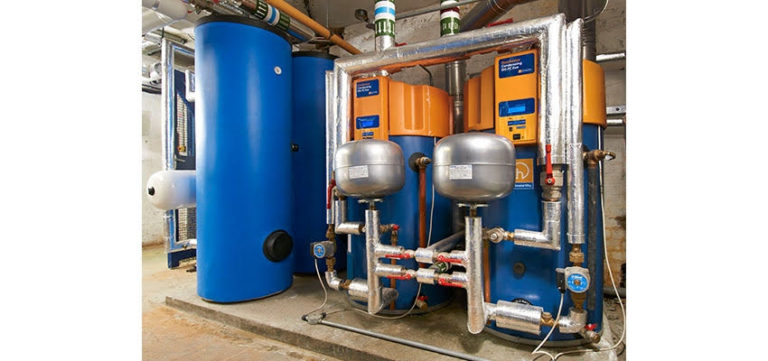Upgrade Your Commercial Water Heater with Energy Star-Certified Equipment
Whether you use a commercial water heater for basic restroom applications or to fulfill hot water requirements for production, manufacturing, or a commercial kitchen, the time will come when you’ll need to consider an upgrade.
Is the Time Now?
Commercial water heaters are typically very hardy pieces of equipment that have an average life span of 10 to 15 years. With regular maintenance and care, you’ll likely have little trouble with your water heater over most of that period of time.
However, there are some things to watch for during the later years that may signal it’s time for an upgrade. For example, if you notice that your commercial water heater is suddenly struggling to deliver the hot water you need, or that you’ve seen a significant uptick in the number of repairs you suddenly have to make, it may be time to make the switch.

Remember that new commercial water heaters are always more energy efficient than older models, which will allow you to recoup some of your investment in new equipment through lower utility bills. In addition, you’ll also make a positive difference in the environment with a more efficient water heating system.
Types of Commercial Water Heaters
Several different types of commercial water heaters exist and are designed for different applications. Some require a tank to hold heated water but others do not. Here’s a quick primer:
- Gas with Tank. Gas water heaters use natural gas or propane to heat water that is then stored in a tank.
- Electric with Tank. Storage tank water heating systems can also use electricity to heat water until it is needed.
- Solar with Tank. Innovative technology uses solar heat to deliver the energy required to heat water in a tank system.
- Heat Pump with Tank. Heat pumps use a refrigerant-based system to absorb heat in the surrounding area, which is then used to heat water. Fuel is not needed to generate the heat, making heat pumps extremely efficient.
- Tankless Electric, Gas or Propane. These systems produce hot water on demand, reducing the energy losses associated with storing hot water. They can be expanded on a rack system to meet the growing needs of a facility.
Energy Star Equipment
If you’ve decided to make the investment in a new commercial water heater, take some time to research information from Energy Star. This program, run by the U.S. Environmental Protection Agency and the U.S. Department of Energy, provides free information about the energy consumption of different commercial water heaters to help you make the best decision.
Rely on Professionals
Before you start your commercial water heater replacement project, find a reputable professional to be your partner. Taking the time to review your current hot water needs and speak with a professional about the best type of commercial water heater to purchase is well worth the effort.

Which system will work best for you will depend on the type of facility you have, the number of people who access the hot water, the applications you require, and the storage space you have for equipment. A professional can help you review these factors and others to determine whether a gas, electric, or oil system will work best as well as the size needed.
Partnering with a professional also means having access to warranties on equipment and labor. Often, you can negotiate an ongoing maintenance and service contract so you’ll always have the support you need to keep your commercial water heater running efficiently and effectively.
Benefits of Energy Star Water Heaters
Upgrading your commercial water heating equipment to an Energy Star-certified system can generate several benefits for both your organization and the environment.
- Energy Savings. According to Energy Star, if all commercial water heaters in the country were certified, the energy cost savings would total nearly $890 million. Depending on the size of your organization, the reduction in your monthly utility bill could be significant.
- Emission Reductions. Energy Star also states that switching to only certified commercial water heaters would eliminate more than 17 billion pounds of annual greenhouse gas emissions from the environment. Every small step made by a business or organization can make a difference in both their local community and in the world as a whole.
- High Water Quality. Depending on the applications needed, a new commercial water heating system can deliver higher water quality. This could be particularly important for businesses such as restaurants that may rely on having a reliable source of safe water for all their operations.
- Turnkey Implementation. In some cases, a commercial water heating system may be a turnkey installation, which can reduce the amount of downtown required for the upgrade.
- Fewer Repairs. Replacing an older commercial water heater with a new Energy Star system can reduce the time, stress, and money spent on trying to keep an antiquated system operational, allowing facilities managers to focus on other priorities.
Conclusion
If your facility is experiencing commercial water heater issues — such as a growing number of repairs, insufficient hot water, or rising energy costs — it may be time to consider an upgrade. Be sure to talk with a professional to help you properly size and choose your new commercial system. Remember that Energy Star-certified equipment can save you significant amounts of energy in the long run, which means not only cost savings for you but also a positive contribution to the environment.


